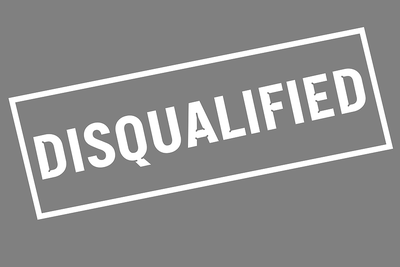 When placing a horse racing bet, you will generally expect one of two possibilities. Either your bet wins or it loses. However, things aren’t always as straightforward as that. There is always the possibility that your horse may be declared a non-runner – undoing all of your hard work, but at least seeing your stake returned to you (unless you placed your bet on an Ante Post market).
When placing a horse racing bet, you will generally expect one of two possibilities. Either your bet wins or it loses. However, things aren’t always as straightforward as that. There is always the possibility that your horse may be declared a non-runner – undoing all of your hard work, but at least seeing your stake returned to you (unless you placed your bet on an Ante Post market).
However, even wins, losses, and non-runners don’t cover the full spectrum of racing outcomes that are possible. There is also the chance that the horse you have backed may win or finish placed in a race, only to be disqualified. So what happens to your bet in such a scenario?
Thankfully, disqualification counts amongst the rarest of racing results, but that scarcity has resulted in some confusion regarding the betting implications should a horse be thrown out of a race. Here we look at the various reasons a horse may be disqualified and what this means for punters.
Why Might a Horse Be Disqualified?

- Wrong Weight – For any given horse race, all runners are allocated a specific weight which they must carry. In order to ensure that all competitors adhere to this weight rule, jockeys – complete with all equipment and weight cloth – are weighed before (weighing out) and after (weighing in) every race around the world. It may be possible to rectify a weight discrepancy during the weighing-out process, but if a jockey weighs in incorrectly, the horse will be disqualified. Likewise, if, for whatever reason, a jockey fails to weigh in entirely, their mount will be disqualified.
- Interference – By the very nature of the sport, some degree of scrimmaging for position and contact between runners is inevitable during a horse race. However, there are limits placed on just how much interference is acceptable. If, when reviewing a race, the stewards decide a horse has interfered with, intimidated, or impeded a rival in a manner which has affected the finishing positions, the guilty party may be demoted or, in extreme cases, disqualified entirely. This rule is usually only enforced in particularly close finishes in UK and Irish racing. However, French and US stewards are far stricter – a famous example coming in the 2019 Kentucky Derby when Maximum Security was demoted from 1st to 17th for interference at the top of the straight.
- Wrong Course – Any runner who fails to complete the designated course will immediately be disqualified. One of the most farcical examples of this occurred at Fontwell in 2020, when Dharma Rain finished stone last of the eight finishers, but was declared the winner because he was the only runner to follow the correct course.
- Failed Drugs Test – All trainers must strictly adhere to the sport’s drugs policy when preparing a horse to race. Some drugs are expressly prohibited at all times, whilst others are allowed for medicinal purposes but must be completely out of the horse’s system by the day of the race. If a post-race drugs test reveals that a horse has a banned or restricted substance in their system, it will subsequently be disqualified.
- Wrong Horse – And on rare occasions, a horse may not be who they claim to be (or who connections claim them to be at any rate!). In the past, this has been a deliberate act on the part of owners or trainers, as witnessed in the famous Flockton Grey betting scandal. A more recent example came as a result of simple human error when the Jessica Harrington yard confused Aurora Princess with Alizarine at the 2021 Galway Festival. Whatever the reason, if it is discovered the wrong horse has run in a race, it will promptly be disqualified.
What Will Happen to My Bet?
![]()
The answer to this question depends upon when and why a horse is disqualified. Following any horse race, the result only becomes official once the weighing-in process and any Steward’s Enquiries or objections from losing connections are resolved. If your horse is disqualified at any point between the race finishing and the declaration of the official result, your bet will most often be settled as a loser.
If, on the other hand, your horse is disqualified at a later time, i.e. any point after the declaration of the official result, your bet will be settled as a winner. Bookmakers use the announcement of the official result as their trigger to pay out on a race and will not return to you to request the winnings back if the result is subsequently changed.
The most common reasons for a late alteration to a result are a failed drug test – due to the time taken to obtain results – and an objection, which fails on the day of the race but then later goes to a BHA panel. The other side to this coin is that bookmakers are not obliged to pay out on results amended after the official result has been declared on the day of the race. Which is of course rather hard luck for those who back a second-placed finisher which is later promoted to first.
First Past The Post Concession

Photo © Bill Nicholls (cc-by-sa/2.0)
Should you back a horse who crosses the winning line in front, but is demoted to second place or disqualified when the official result is announced, don’t immediately throw away your betting slip, as you may still be in for a payout thanks to the First Past the Post (FPTP) concession. Also known as Double Result, this promotion is widely available at almost all of the biggest betting companies. Where offered, FPTP sees bookmakers pay out on the runners in the order they cross the finish line AND the amended official result following the weigh-in.
This deal does, however, come with several stipulations. The First Past The Post rule will not apply to runners who have:
- Taken the wrong course
- Weighed in incorrectly
- Failed to weigh in at all
- Been raced in error (in other words, were not the named horse)
- Been declared the winner in error e.g. due to a mistake in commentary
What this effectively amounts to is that you will be paid out under First Past the Post conditions if your selection is demoted or disqualified for reasons of interference, but your bet will be a loser in all other instances. It is also worth noting that the First Past the Post rule applies only to win and each way singles, or standard multiple bets, placed with a high street or online bookmaker on the day of the race. Ante-post wagers, bets placed with an on-course rails bookmaker and Tote Bets are not included in this offer.
